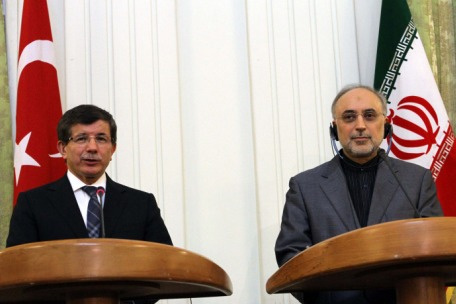Iran’s Conditions for Throwing Its Weight behind Turkey in 5+1 Talks

Tehran, Jan 9, RAJANEWS - About a year after talks between Iran and Group 5+1 in Istanbul ceased because the Western side was not committed to the issues of talks and its obligations, Turkish Foreign Minister Ahmet Davutoğlu visited Tehran once again on Wednesday to reiterate Turkey’s desire to play the role of a mediator after Secretary of the Supreme National Security Council Saeed Jalili announced Iran’s readiness for resumption of talks.
According to Raja News, Davutoglu explicitly announced at a joint press conference with Iran’s Foreign Minister Ali Akbar Salehi that he “carries a message from Catherine Ashton, the European Union foreign policy chief and head of the 5+1 negotiating team, concerning the West’s readiness for resumption of talks with Iran” so that it would be clarified that the West contrary to its rhetorics was eager to resume talks with Iran.
Davutoglu said, “I gave [Ms.] Ashton's message to Mr. Salehi, the Foreign Minister of Iran.”
Salehdi said he had asked EU foreign policy chief, Catherine Ashton, who was representing the world powers, to propose a time and place for the talks, when the two met briefly recently on the sidelines of a conference on Afghanistan in Bonn, Germany.
Salehi stated: “After receiving their proposed time and venue, Iran will announce its viewpoints (about time and venue) and the meeting will be held immediately. In the latest letter sent to Ashton by Jalili about two months ago, Iran’s readiness to continue talks with P5+1 was announced. After that I laid emphasis on this issue. After our talks, Ashton contacted Davutoglu and asked him if Turkey was ready to host the next meeting of Iran and P5+1 at a fixed date. Turkey voiced readiness. After these talks, Turkish foreign minister made a telephone contact with me and I informed Jalili who stressed his readiness.”
Salehi also said Iran is ready to resume talks with Group 5+1 and “we hope that negotiations would be held in a place agreed by the two sides, and in my opinion Turkey is the best place.”
Diplomats in Tehran say during his last month’s visit to Brussels, Davutoglu reached agreement with her on resumption of talks between Iran and P5+1 hosted by Turkey.
However, according to irannuc.ir, Davutoglu’s visit to Tehran and his efforts to revive talks between Iran and P5+1 was made under conditions that previously verbal messages were exchanged between Jalili and Ashton and Iran had announced that it was waiting for determination of time and venue by Ashton to resume talks.
Experts maintain that Turkey’s desire to play an active in the field of talks between Iran and the West carried several strategic messages.
First, Davutoglu arrived in Tehran openly as a representative of the West and conveying a message from Ashton. This shows from strategic point of view that the key objective of the West still was to enter into talks with Iran and all the recent pressures imposed on Iran are not supposed to bear any fruit but sitting at the negotiation table with Iran.
Secondly, in order to play a role in Iran and P5+1 talks, Turkey are willing to prevent the recurrence of the events that happened at two junctures of signing the Tehran Declaration and the Istanbul talks in January 2011 and led to the failure of the talks.
Turks are convinced that the Tehran Declaration failed because was not serious in forging an agreement and the Istanbul talks failed because Iran did not accept direct interaction with the United States. The question, however, is whether Turkey is in a position to manage the course in a way that would prevent a new failure.
Thirdly, from Iran’s point of view, offering a role to Turkey in the future P5+1 talks requires adjustment of the strongly negative role the country plays in the regional developments especially in Syria and also proving Ankara’s neutrality which is at present increasingly accused of being in pace with the United States versus the Islamic revolution in the region.
Fourthly and finally, some experts believe the reason Turkey has been encouraged to mediate in revival of the talks between Iran and P5+1 is the West’s assumption that Tehran would be more flexible at least for the sake of its good relations with Ankara. This is the same mistake the West committed in the Istanbul Talks.
* This piece was originally published in Raja News. Raja News has been a keen supporter of Mahmoud Ahmadinejad, though their support has abated following Ahmadinejad's recent measures which imply his confrontation with Iran's leadership. The first part of the website’s title, Raja, is in fact an allusion to the last name of Iran's second president, Mohammad-Ali Rajaei, who was known for his austere lifestyle and affection for the lower class, a trait Ahmadinejad has been trying to return to the higher echelon of Iranian politics since his presidency.

